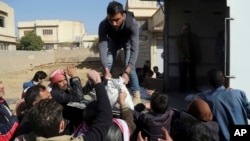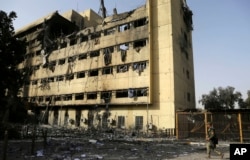A senior U.N. official in Iraq said Wednesday that about 750,000 civilians were still trapped in the western part of Mosul, where the Islamic State group is in control.
U.N. humanitarian coordinator Lise Grande told reporters via video from Irbil that the military offensive against the IS-controlled part of the city could "begin shortly," possibly within "weeks."
She said Mosul had 1.5 million residents when the Iraqi army began its battle on October 17 to retake it from IS fighters who seized control of the area in 2014.
The city is divided by the Tigris River into eastern and western portions, and most of the fighting has taken place in the eastern part of the city. Grande said 140,000 people had fled Mosul since October.
She said that since combat intensified on December 29, 75 percent to 80 percent of eastern Mosul had come back into the control of Iraqi security forces. That has allowed the U.N. and its humanitarian partners to reach about a half-million people with lifesaving assistance in liberated neighborhoods and camps for the displaced.
Possible danger
Grande warned that despite those gains, civilians could face serious dangers and siege-like conditions when the battle for western Mosul begins.
"Siege is a very real possibility," Grande said. "A siege of 750,000 people would have absolutely enormous implications."
She said the U.N. was trying to pre-position as many humanitarian supplies in western Mosul as possible. But an agreement with Iraqi security forces and the coalition about how to do that — be it through arranging air drops, scattering small packages of field rations, or bringing supplies from the eastern part of the city — has not been finalized.
"For humanitarians, knowing a siege is a possibility, this is one of our top priorities," Grande said.
Humanitarians began planning for the Mosul offensive nearly a year ago, looking at scenarios that calculated for worst-case situations, including the displacement of 1 million people. So far, the most dire predictions have not materialized, but some of the biggest battles still lie ahead.





